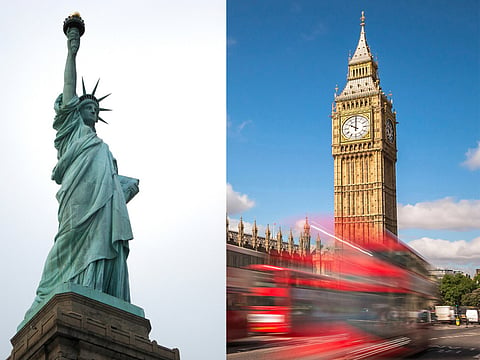How Britain and America are more similar than ever
UK is now defined by Starbucks and Facebook, McDonald’s and Netflix, bringing with them a whole new set of cultural values from America

I’ve heard it said that Britain and the United States stand further apart than ever. If Americans only understood the British through US President Donald Trump’s tweets, they’d think Britain was a terrorist’s cave. And to many Brits, Trump is not only personally distasteful but indicative of everything that makes America not Britain: Too loud, too proud, too vulgar.
And yet, 2018 should see the two nations bonded together by royal marriage. Prince Harry will wed an American. It’s not controversial. It feels “right”. It’s a testament to how similar the two countries have become.
My kind of Britain is small and sleepy: I’d be quite happy if every time the world came knocking, we hid behind the settee and pretended not to be in. If the England of my youth, in the 1980s, resembled anywhere, it was Japan: An island off a hostile continent, obsessed with good manners. I remember, when I was learning tennis, encountering a sweet Japanese lady who apologised every time she won a point.
America, on the other hand, I loved because it was different. Burgers and milkshakes. Betty and Bill’s Glorious Gospel Hour. To say they had no class wasn’t an insult but a compliment to a country that, unlike Britain with its complicated and debilitating social rules, didn’t give a damn where you came from but was all ears as to where you were going.
On my first trip to the Deep South, an American stopped me in the street to ask if I had the time of day. Forgetting that I was in Georgia rather than London, I assumed I was about to be mugged and almost offered him my watch. It turned out he was just a nice person. When an American says “have a nice day”, you see, they actually mean it.
Fast forward to 2018. Britain has certainly been colonised. Britons are now defined by Starbucks and Facebook, McDonald’s and Netflix, which have brought with them a whole new set of cultural values built around meritocracy, capitalism and openness. One reason why Prince Harry and Meghan Markle seem such a good match is that Harry is quite American in outlook. He talks about his feelings. He admits his vulnerabilities. He is fascinated by the lives of others; he is dedicated to egalitarian values that make him seem more like a plutocrat in spirit — like his good friend Barack Obama — than a European aristocrat.
Harry has far less of the reserve associated with the Windsors, which I write not to pass judgement on anyone, but to mark the dying of a brand of Britishness that you see on display in popular TV series The Crown, which itself belonged to a particular time and place.
Look beyond the headlines, beyond the snobbery shown towards America’s so-called “rednecks”, and what I find striking is how much closer in spirit America and Britain are than they were in my youth. Britain should try to make the most of that. Britain’s tortuous negotiations with the European Union have reminded Britons of precisely why they voted to leave: The cultural gulf that stretches across the Channel is wider than the Atlantic. The Europeans are prisoners of ideology and their own grim history.
The youthful Americans — who collect other people’s histories like bone china — are, like Britons, fundamentally interested in getting a good deal and making money. Love him or loathe him, Britain knows where it stands with Trump. When Emmanuel Macron speaks, however, one needs a degree in continental philosophy to understand what he’s going on about.
Between Britons and Americans, they can Make the Atlantic Great Again.
— The Telegraph Group Limited, London, 2018
Tim Stanley is an English blogger, journalist and historian.



